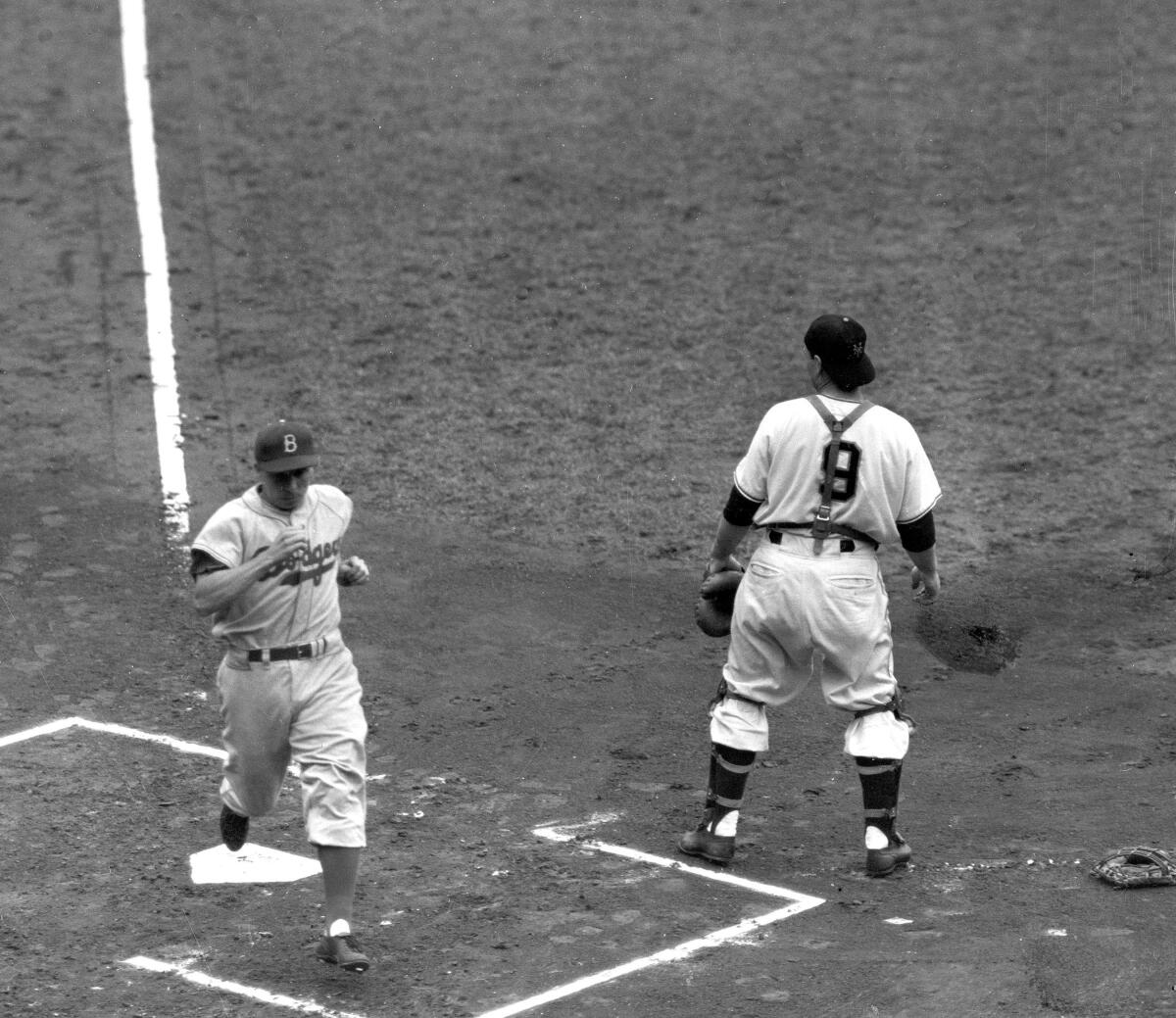Dodgers Dugout: The 25 greatest Dodgers of all time, No. 9: Pee Wee Reese

Hi, and welcome to another edition of Dodgers Dugout. My name is Houston Mitchell as we continue the top-25 countdown.
Are you a true-blue fan?
Get our Dodgers Dugout newsletter for insights, news and much more.
You may occasionally receive promotional content from the Los Angeles Times.
Readers voted in droves, submitting 15,212 ballots by email, Twitter and Facebook. Voters were asked for their top 10 Dodgers in order from 1 to 10, with first place receiving 12 points, second place nine points, third place eight, all the way down to one point for 10th place.
The last time we did this was in 2018, and there were some changes in the rankings.
So, without further ado:
Enjoying this newsletter?
Your support helps us deliver the news that matters most. Become a Los Angeles Times subscriber.
The 25 greatest Dodgers, No. 9: PEE WEE REESE (41 first-place votes, 29,854 points)
2018 rank: 10th
Pee Wee Reese is a Hall of Fame shortstop and an iconic member of the “Boys of Summer.” That alone is good enough to make him one of the greatest Dodgers of all time, but there’s another reason too: His actions before and after Jackie Robinson joined the team.
Harold Henry Reese was born on July 23, 1918, in Meade County, Ky. When he turned 21, he was 5 feet 6 and 160 pounds, but he was called “Pee Wee” long before that. Not because of his size, because of his other hobby other than baseball: marbles. He won a couple of pee wee marbles competitions in Kentucky, so people started calling him Pee Wee.
After graduating from high school, Reese, who played in only five baseball games in his senior year, didn’t seem headed for Major League fame. He took a job as a cable splicer for a telephone company. He often said that climbing all those poles made him much stronger physically and helped him reach the majors.
Reese led his semipro team to the Louisville city championship in 1937 and signed with the minor league Louisville Colonels. He did so well there that Boston Red Sox owner Tom Yawkey bought the Colonels in 1938 in order to secure the rights to Reese. One problem: the Red Sox were led by Joe Cronin, one of the best shortstops around. Cronin did not want to move from short to make room for Reese, so Yawkey decided midway through the 1939 season to sell Reese’s contract to the Brooklyn Dodgers for $35,000 and two players, Red Evans and Art Parks, neither of whom ever played for the Red Sox, so it was quite a good deal for the Dodgers.
Reese made it to the majors in 1940 and was a great fielder, but only an average hitter for three seasons before he spent three years in the Navy with the construction battalion. He returned to the Dodgers for the 1946 season and was a much better hitter, batting .284 with 87 walks.
In spring training of 1947, a few Dodgers signed a petition that threatened a players’ boycott if Robinson joined the team. When it came time for Reese to sign, he refused, later saying, “If he’s man enough to take my job, I’m not gonna like it, but, Black or white, he deserves it.”
But the most famous moment in the Reese-Robinson friendship came in 1947 in Cincinnati. During pregame infield practice, Robinson was taking his usual verbal abuse from the crowd. Reese, a Southerner from Kentucky with friends attending the game, walked over to Robinson and put his arm around him while talking to him, a gesture that silenced much of the crowd.
Years later, when asked about it, Reese said, “I was just trying to make the world a little bit better. That’s what you’re supposed to do with your life, isn’t it?”
Reese moved with the Dodgers to Los Angeles in 1958 and that was his final season in the majors. He was a coach for one season, then moved into the broadcast booth with CBS. He was a broadcaster for many years.
Reese died on Aug. 14, 1999. He was 81.
At his funeral, Joe Black, one of the first Black pitchers in the majors and a former teammate of Reese, said: “Pee Wee helped make my boyhood dream come true to play in the majors, the World Series. When Pee Wee reached out to Jackie, all of us in the Negro League smiled and said it was the first time that a white guy had accepted us. When I finally got up to Brooklyn, I went to Pee Wee and said, ‘Black people love you. When you touched Jackie, you touched all of us.’ With Pee Wee, it was No. 1 on his uniform and No. 1 in our hearts.”
Previously
One week to go
We are down to the final seven games of the regular season. The most important thing in these games: No injuries. We don’t need a repeat of Max Muncy getting hurt in the final game of the season.
“You still have to field a team, and any player that runs out there and plays, there’s always a chance for injury,” Dave Roberts said. “Could you potentially overdo it [by playing regulars too much]? Sure. But there’s also a psyche part of it that guys have to still feel like they’re getting ready. To be honest, we only have [seven] games left, and I want Mookie and Freddie to give it a good run for this MVP. Everyone knows Colorado is a hitter-friendly place, and if they can throw out some hits and some homers, pad their stats, and we win some baseball games, I’m all for that.”
200-hit club
Freddie Freeman got his 200th hit of the season last week. Here’s a look at Dodgers with the most 200-hit seasons:
Six times
Steve Garvey
Four times
Zack Wheat
Three times
Willie Keeler
Two times
Johnny Frederick
Babe Herman
Jimmy Johnston
One time
Adrián Beltré
Tommy Davis
Freddie Freeman
Lefty O’Doul
Mike Piazza
Jackie Robinson
Steve Sax
Milt Stock
Maury Wills
Up next
Tuesday: Game 1: Dodgers (TBD) at Colorado (TBD), 12:10 p.m., SportsNet LA, AM 570, KTNQ 1020
Tuesday: Game 2: Dodgers (Bobby Miller, 10-4, 3.97 ERA) at Colorado (TBD), 5:40 p.m., SportsNet LA, AM 570, KTNQ 1020
Wednesday: Dodgers (TBD) at Colorado (TBD), 5:40 p.m., SportsNet LA, AM 570, KTNQ 1020
Thursday: Dodgers (TBD) at Colorado (TBD), 5:40 p.m., SportsNet LA, AM 570, KTNQ 1020
In case you missed it
Staying sharp and staying healthy. What the Dodgers have to play for this week
Plaschke: The Clayton Kershaw Crusade is making a stirring last stand
Margarita Mota, wife of Dodgers great Manny Mota and baseball family matriarch, dies at 81
Broken rib? Bad habits? Dodgers seeking answers to Will Smith’s second-half struggles
And finally
Pee Wee Reese’s Hall of Fame induction speech. Watch and listen here.
Until next time...
Have a comment or something you’d like to see in a future Dodgers newsletter? Email me at [email protected], and follow me on Twitter at @latimeshouston. To get this newsletter in your inbox, click here.
Are you a true-blue fan?
Get our Dodgers Dugout newsletter for insights, news and much more.
You may occasionally receive promotional content from the Los Angeles Times.




